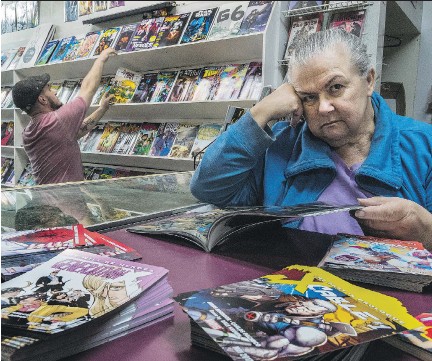Love, comic books and addiction have colluded to keep Astro Books alive for more than three decades. But of late, Montreal’s rising commercial tax rates, construction and the indignities of age are conspiring against it.
After 33 years mainly in Notre-Dame-de-Grâce on Sherbrooke St., and downtown on Ste-Catherine St. a bit west of Guy, one of the largest comic-book retailers in the country is appealing to its local community with a crowdfunding campaign to help cover its $20,000-plus share of the landlord’s tax bill.
After a slow winter in which drivers who fear construction detours were reluctant to venture downtown while other customers chose cocooning over browsing, owners Paul and Betty Stock were unable to save for the tax hit. The financial situation for the siblings, for whom the store is both a lifeline and a way of life, is tight.
“If the money doesn’t come in, I think we will have to close. I think so,” says Betty, 71, who deals with customers and staff with a seasoned grumpiness offset by the twinkle in her eye. “And that’s hard.”
On top of the tax bill, Astro Books (or Librairie Astro, as the awning reads) has to deal with rent north of $3,500 a month, rising hydro and water meter bills and salaries for four employees.
The store’s dog-eared appearance and a window display featuring used books ranging from Shakespeare’s Othello to a dated copy of Lonely Planet’s guide to India belies a well-organized enterprise that sells in the range of 100,000 comic books a year, as well as CDs, videos, graphic novels, collectible cards and used books of the popular fiction variety.
Key to the comics sales is a reserve system for 400 clients (it used to be 600) for whom Astro puts aside new orders as deliveries come in each week. Most customers pick them up, while some orders are mailed out as far as Taiwan. Some clients order dozens of titles — one pays $125 a week for his comic fix — but most are in the $10-to-$15-a-week range.
It has made Astro one of the largest retailers of new, used and collectible comics in Canada, with loyal customers dating back more than 20 years. They shifted their focus to comics and closed their N.D.G. store about 15 years ago when the book market slumped.
Stock says she’s seeing a shift back toward print, both for books and comics, that is also evidenced in growing sales of printed books worldwide as the popularity of Kindle and other e-readers declines.
“If we can get through this year, I think we can make it,” she said. “Book sales are getting better, and comic book sales, which had bottomed out, are climbing. People are seeking that tactile experience.”
As customers who grew up on superhero fare have matured and evolved, so have comic books, branching out to a wide variety of genres that include murder mysteries and romantic comedies. Ms. Marvel, about a New Jersey high school girl of Pakistani descent who suddenly attains superhero powers, is the first comic to have a Muslim headliner; it was a smash hit, indicative of publishers’ willingness to reflect a more diverse society, noted store clerk David Villeneuve. Acclaimed writers like Margaret Atwood and Fight Club author Chuck Palahniuk have entered the graphic-novel genre.
For customers like Sean Gallagher, it’s the ambience and the availability of new genres, many chosen for him by store employees, that have kept him coming back for 20 years.
“I like the convenience, and the atmosphere,” says Gallagher, a 42-year-old computer designer who fell in love with comics at the age of nine.
Gallagher is also picking up titles like Looney Tunes and Teen Titans for his seven-year-old son, aiding in the store’s marketing strategy of “getting them addicted.” Because comic books are written as serial novels, with storylines spanning multiple editions, once a reader has read one, they want to see how it ends.
“They find a used comic at $1 — it gets them hooked,” Stock says. Soon, hopefully, they’re following a few titles a month.
For Von Allan, both a customer and a comic-book creator and graphic novelist, much of the store’s charm lies in its willingness to support and promote lesserknown titles outside of the mainstream, including his own.
“A store that is willing to lend a hand and help rookies get started is rare,” Allan said. “And Paul’s been doing that for decades. I can’t stress that enough. For a young artist starting out, it means the world. We need more stores like this, and I’m saying that as a friend, customer and comic creator.”
The last few years have been hard on the Stocks. Betty walks with two canes, but still comes in daily. Paul, 67, got past a bout of flesh-eating disease several years ago, then suffered a stroke about five years back that left him partially paralyzed. He still comes in for a few hours a day, and works from home.
“If this store closes, he would turn into a vegetable,” Betty says. “So will I. I’m not looking for that.”
Across the street at Capitaine Québec, neither is owner Charlie Vaccaro. With three comic stores in a three-block radius downtown, the close-knit competition is good for business, he said, bringing in customers from all over Montreal.
“If Astro closes, it might be short-term gain for me in terms of getting a few reserve-list customers, but … it would be long-term pain,” he said.
After half a lifetime serving book lovers and comic-book addicts, Betty says it’s the fun she would miss.
“Generally, the comic-books community is a very nice community,” she said. “We’re nice, and a bit weird.”
A link to Astro Books’ crowdfunding page is available at their website, astrolib.com.
A store that is willing to lend a hand and help rookies get started is rare. And Paul’s been doing that for decades. I can’t stress that enough.




